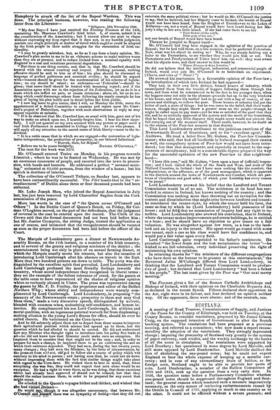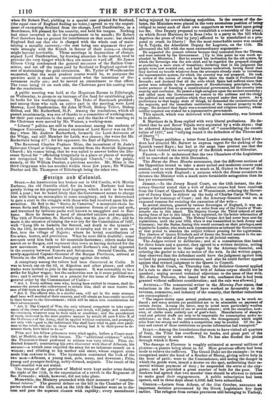SCOTLANP.
A meeting of Road Trustees, Commissioners of Supply, and Justices of the Peace for the County of Edinburgh, was held on Tuesday, at the County Rooms, to consider resolutions, proposed by Sir James Gibson Craig, on the supposed intention of Government to alter the Scotch banking system. The resolutions had been proposed at a previous meeting, and referred to a committee ; who now made a report recom- mending the adoption of the resolutions. They strongly deprecated change ; imputing the prosperity of Scotland very greatly to the system of paper currency, cash credits, and the weekly exchange by the banks of all the notes in circulation. The resolutions were supported by Lord Rosebery ; but questioned in some degree by Lord Melville, and still more opposed by Lord Dunfermline, Lord Melville disliked the idea of abolishing the one-pound notes; but he could not expect England to bear the whole expense of keeping up a metallic cur- rency; and in case of any extraordinary drain of bullion, as for foreign corn, Scotland ought to be able to provide her quota of coin. Lord Dunfermline, a member of the Bullion Committees of 1810 and 1818, took up the question from a very early date. In 1826, the question came before a Parliamentary Committee whether one-pound notes should be suppressed throughout England and Scot- land; the general reasons which rendered such a measure imperatively necessary, as the only means of retrieving embarrassments caused by the Orders in Council of 1797, applying as much to one country as to the other. It could not be effected without a severe pressure; and
when Sir Robert Peel, yielding to a special case pleaded for Scotland, (the equal case of England finding no voice,) agreed to try the experi- ment of exempting Scotland from the change, Lord Dunfermline, as a Seotchman, felt pleased for his country, and held his tongue. Nothing had since occurred to show the experiment to be unsafe ; Sir Robert Peel therefore has no ground for interference on that score: but should England find out that she is charged with the whole cost of main- taining a metallic currency,—the cost being one argument that pre- vails strongly with the Scotch in favour of their notes,—a change might become inevitable. These meetings in deprecation of change, argued Lord Dunfermline, by drawing attention to the matter, tend to provoke the very danger which they are meant to ward off. Sir James Gibson Craig condemned the general measures of the Bullion Com- mittee, and set off the taxes paid by Scotland to England against the cost of maintaining the gold circulation. Mr. Tytler of Woodhouselee suggested, that the most prudent course would be, to postpone the question until it should be ascertained what the intentions of Go- vernment really are ; and be moved an amendment to that effect. The votes being 13 on each side, the Chairman gave his casting-vote for the resolutions.
A public meeting was held at the Hopetoun Rooms in Edinburgh, on Wednesday, to promote an increase of the fund for establishing pub- lic baths for the working-classes. The Duke of Buceleuch presided; and among those who took an active part in the meeting, were Lord Murray, Lord Dunfermline, Sir John M`Neill, Bishop Terrot, Bishop Gillies, and Mr. Rutherfurd, M.P. Among the resolutions, which all passed unanimously, was one of thanks to a committee of working-men, for their past exertions in the matter ; and the thanks of the meeting to the Chairman were moved by Mr. Watson, a working-man.
"Liberal " politics are still in the ascendant among the students of Glasgow University. The annual election of Lord Rector was on Fri- day ; when Mr. Andrew Rutherfurd, formerly the Lord-Advocate of the Whigs, and still Member for Leith, was chosen ; the votes for Mr. Rutherfurd being 277 ; for his opponent, the Earl of Eglintoun, 185.
The Reverend Charles Popham Miles, the incumbent of St. Jude's Episcopal Chapel at Glasgow, has seceded from the Scottish Episcopal Church ; his reason being, that he was called to answer before the Dio- cesan Synod for " officiating irregularly in a place or places of worship not recognized by the Scottish Episcopal Church,"—in the pulpit, namely, of Sir William Dunbar, a previous seceder. Mr. Miles is the third clergyman who has seceded within these fevr years ; Sir William Dunbar and Mr. Thompson of Edinburgh being the other two.



























 Previous page
Previous page